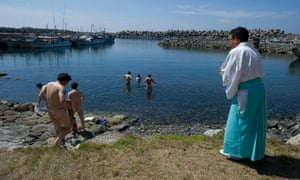Japanese sacred island where women are banned gets Unesco world heritage listing | World news
A sacred island in south-west Japan that bans women and where male visitors must strip naked before going ashore has been declared a Unesco world heritage site.
Okinoshima, located midway between the south-western main island of Kyushu and the Korean peninsula, was once the site of rituals to pray for maritime safety and a centre for relations with China and Korea that stretch back as far as the fourth century.
The 700-square-metre island, along with three nearby reefs and four other related sites were given world heritage status at the UN body’s annual summit in Krakow, Poland, at the weekend, bringing the number of Japanese cultural and natural sites on the list to 21.
Priests from Munakata Taisha, a group of Shinto shrines, are in principle permitted to travel to worship at the island’s 17th century shrine, Okitsu.
In addition, up to 200 men are allowed to visit only once a year, on 27 May, to honour sailors who died in a nearby naval battle during the 1904-05 Russo-Japanese war.
Before they go ashore, they must observe centuries-old rituals, including removing their clothes and undergoing misogi â€" bathing naked in the sea to rid themselves of impurities. They are prohibited from taking home mementoes, including small objects such twigs, pebbles and blades of grass, according to the island’s website.

The reason for the ban on women has never been publicly stated, but one theory â€" which extends to other aspects of Japanese culture â€" cites the Shinto belief that menstrual blood is impure.
Okinoshima is home to a huge collection of artefacts attesting to its importance as an early centre of international exchange.
Around 80,000 items regarded as national treasures have been unearthed on the island, including mirrors from Wei dynasty China, gold rings from the Korean peninsula and fragments of a glass bowl from Persia.
Unesco status will give Okinoshima access to funds for its upkeep, but some nearby residents have voiced concern that the island could be ruined by rogue tourists.
Takayuki Ashizu, the chief priest at Munakata Taisha, said the ban on tourism â€" and women â€" would stay in place, despite a flood of inquiries from travel agencies.
“We wouldn’t open Okinoshima to the public even if it is inscribed on the Unesco cultural heritage list, because people shouldn’t visit out of curiosity,†Ashizu told the Japan Times last year.

0 Response to "Japanese sacred island where women are banned gets Unesco world heritage listing | World news"
Posting Komentar